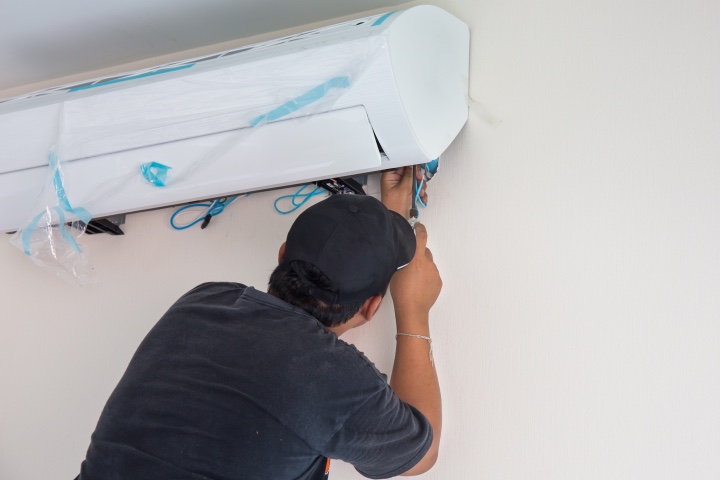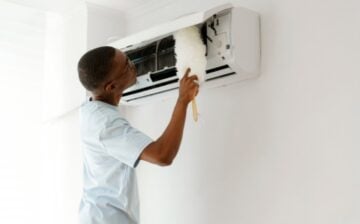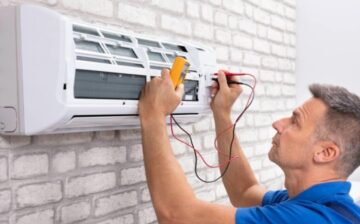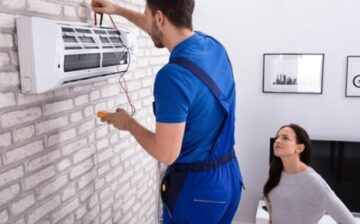Moving into a new home is exciting, but it also comes with responsibilities—like making sure your cooling system is up to par with your current cooling needs. If your air conditioner (AC) is old, inefficient, or struggling to keep up, you might need a replacement. But how do you know for sure that’s the only recourse that you have?
Don’t sweat it—literally. This post will guide you through the key signs, the average cost of the whole project, and considerations so you can make an informed decision to determine whether the air conditioner replacement cost is worth it. Read on to learn more.
Check the Age of Your AC
ACs, including central air conditioning units and others, typically last a whole decade. If yours is pushing 15 years or older, it’s likely on borrowed time. Even if it’s still running, older units are far less efficient than modern ones, meaning higher energy bills, more frequent repairs, and no peace of mind.
Check the manufacturer’s label (usually placed on the outdoor condenser) for the installation date. If you can’t find it, a heating, ventilation, and air conditioning (HVAC) technician can help – not only that but HVAC experts can walk you through the entire process of replacing your AC. You can check out HVAC professionals’ sites like https://www.logan-inc.com and others for more information.
Assess Your AC’s Current Cooling Performance

Does your home feel unevenly cooled? Do some rooms stay hot while others freeze? An aging or failing AC struggles to maintain consistent temperatures.
Here’s how to test your AC to see if its cooling performance is still there: first, set the thermostat three to five degrees lower than room temperature. Wait 30 minutes and check if the air feels cooler. Then, if it’s still warm or takes too long, your central air unit or AC may be starting to lose its efficiency and it needs to be replaced soon.
Listen up for Unusual Noises Coming from Your AC
A well-functioning AC runs smoothly with a steady hum. But if you hear any grinding or screeching (caused by a worn-out motor or belt), banging or clanking (due to loose or broken AC parts), and/or hissing or bubbling (due to a refrigerant leak), it’s time for a professional inspection. Frequent strange noises often mean your system is holding on for dear life.
Monitor Your Monthly Energy Bills
If your electricity bills keep climbing without increased usage, your AC could be among the culprits. Older AC units work harder to cool your home – forcing higher energy consumption as a result.
Compare past bills—if costs spike every summer despite normal use, upgrading to high-efficiency air conditioners could save you money long-term in the form of monthly energy savings.
Inspect for Frequent Repairs
A one-time fix is normal, but if you’re calling for repairs every few months, you’re throwing money at a failing system.
Ask yourself the following questions. Have you spent a lot of money on AC repair in the past year? Is the AC still underperforming after fixes were made? If you answered a ‘yes’ to both, air conditioning replacement is likely the smarter investment.
Look for Refrigerant Leaks
Older ACs often use R-22 refrigerant (Freon), which is no longer produced due to environmental regulations. If your system leaks, recharging it is expensive and only a temporary fix.
Newer models use R-410A (Puron), which is eco-friendly and more efficient. If your AC still relies on R-22, replacement is inevitable.
Test Airflow and Humidity Control
A good AC doesn’t just cool—it also reduces humidity. If your home feels sticky or muggy, your system isn’t dehumidifying properly.
Check vents for weak airflow. If some rooms feel stuffy, your AC might be struggling to distribute air evenly.
Evaluate Energy Efficiency or SEER Rating
The Seasonal Energy Efficiency Ratio (SEER) measures cooling efficiency. The higher the SEER, the energy usage rates are lower.
If your central air conditioning system’s SEER is below the recommended standards, upgrading could cut energy costs by almost half.
Consider Environmental Impact
An older AC unit costs more power and uses harmful refrigerants. If you care about reducing your carbon footprint, AC replacements that have high-efficiency and eco-friendly models are a smart choice.
New systems meet stricter environmental standards, making them better for your wallet and the planet.
Get a Professional Assessment
If you’re unsure, schedule an HVAC inspection. A technician can check refrigerant levels, test system efficiency, spot leaks or mechanical issues, and give an honest recommendation. Many companies offer free estimates, so you’ve got nothing to lose.
Explore New AC Options
If replacement is the way to go, consider the different types of air conditioners below:
- Central air conditioners are best for whole-home cooling but may have a steep upfront cost;
- Ductless mini-split AC systems are great for zone cooling or homes without ducts; and
- Heat pumps offer efficient heating and cooling in a single unit.
Look for energy-efficiency certified models for maximum savings on your electricity bills per month.
Factor in HVAC Installation Rebates and Incentives
Many utility companies and governments offer rebates for upgrading to energy-efficient systems. Check available local utility programs, federal tax credits, HVAC manufacturer promotions, and others. These can offset installation costs by hundreds (or even thousands) of dollars.
Make a Decision and Enjoy Better Cooling Today
If your AC is old, inefficient despite routine maintenance, or posing additional costs on you in terms of higher energy payments and the like, HVAC replacement is often the best move.
You’ll enjoy the following once you avail of a new, replacement air conditioner:
- Lower energy bills;
- More consistent cooling;
- Fewer repairs;
- A greener home;
- Return on investment on a new air conditioner over time is much desired; and others like them.
Don’t wait until a total breakdown—proactively evaluate your system and make the call before the intense summer heat hits hard.
Final Thoughts
Your AC is a long-term investment. If it’s struggling, replacing it now can save you money, stress, and discomfort later. Use this guide to assess your system, consult a professional, and decide what’s best for your home.
Ready for a cooler, more efficient home? Take the first step today.
We hope you found this blog post on How to Evaluate if Your New Home Needs Air Conditioner Replacement, useful. Be sure to check out our post on Signs that Your Evaporative Cooler Needs Repair for more great tips!
Have Experience in the Moving Industry? Want an Additional Income Stream? Work With All Around Moving!
Partner with All Around Moving and join the Work With Us program. We’ll help you make money arranging moving services, by establishing your own moving consultant business operation. Read here for more.





